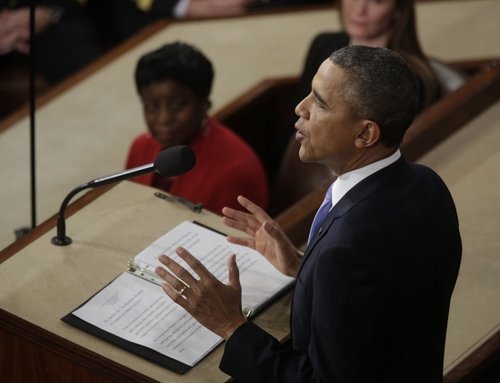
Michael Cornfield is an associate professor of Political Management and the research director of the Global Center for Political Engagement.
It is common to refer to the State Of The Union Address as a “laundry list.” Laundry lists spell out mundane tasks, and an hour-long recitation of goals, prolonged by applause, and then further prolonged by punditry, certainly qualifies.
It can be tedious television, although no more tedious than Super Bowl Sunday, an awards show or – as long as we’re going to talk about income inequality — “Downton Abbey.”
To us in political management, however, this annual ritual of the president asking various political forces to take action serves as a reconnaissance flight over a vitally important and sometimes fascinating territory. After all, the items on the list concern jobs, health, safety, freedom and the life of the United States as a nation.
The practical way to analyze the address is to examine not just the topics raised, but also who got asked to do what, how persuasively the asker performed and then – by tomorrow—how those tasked have publicly reacted. Such an analysis can provide a valuable guide to the political year ahead.
Review the speech transcript and you will see that Obama asked Congress for a lot of actions, which is par for the course. He entwined these asks with statements of what his administration intends to do on the same item: We’ll create six more high-tech hubs, you should fund another six. Pass that Iran super-sanction bill and I’ll veto it.
Insiders anticipated that Obama would talk about income inequality. It has been a big topic this winter, keynoted in remarks by three of the world’s most prominent leaders: Pope Francis, New York City Mayor William de Blasio and Obama himself. Obama did indeed address the topic last night, but in the more centrist terminology of individual opportunity and mobility.
Dealing with the nation’s worrisome debt to GDP ratio was not on this year’s list. The word “debt” appeared once in the speech, and it was modified by “student loan,” not “federal.” The administration is helping students, Obama said, and Congress should too.
While the bulk of the address was aimed at Congress, the president also asked businesses to do what they can to raise the wages of their employees. He asked the American people to buy a new type of savings bond called MyRA, and to help those without health insurance to enroll in a program. These asks constitute acceptance, even an embrace, of the limits of government power.
The climax of the speech could be described as another item on the laundry list: “pay tribute to wounded veterans.” That is the oldest tactic in the manual. But the tribute turned out to be the opposite of mundane.
And with that, the national political discourse will fold State of the Union 14 into the presidential narrative, turn to Congressional campaigns and leap into whatever crises arise. The list, however, will remain a useful index when approaching policymaking, budgeting and other hotly contested issues.




